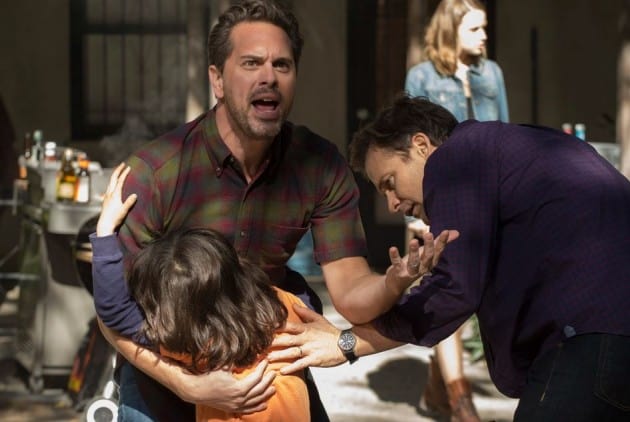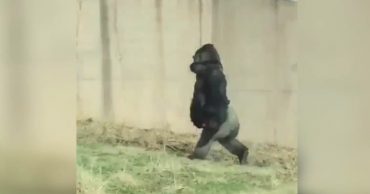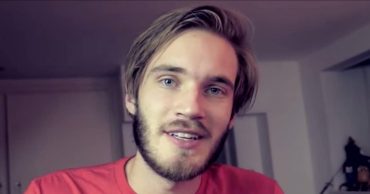![]()

NBC’s eight-hour limited series The Slap premiered on Thursday at 8 p.m. to a modest 1.1 rating among adults 18-49 and 5.1 million viewers and harsh reviews. The American incarnation of the Australian show that derived from a book with the same name, written by Christos Tsiolkas, was adapted by Jon Robin Baitz and has one of the biggest casts on TV. That being said, this is a show I wanted to like. And although hope is not all gone, it might be on assisted living.
At the center of the The Slap‘s pilot is Hector, played by chameleon Peter Saasgard, who, unsurprisingly, doesn’t miss a single beat in his take of the character. In the original version, Hector is embodied by Jonathan LaPaglia, and the character acts much more like a teenager than like a grown up man. In my opinion, this more serious head of the family has an extra layer that was interesting to encounter.
Hector is married to Aisha (Thandie Newton), and together they have two children. In addition, he did not get a promotion at his job for the City of New York and can’t seem to voice that to his own wife that, as he is turning 40, he feels trapped in his domestic life. He cannot manage to quit smoking and lacks the capacity of deviating from anything his parents impose. By the way, he acts highly inappropriately with the nanny of his children/wife’s assistant, Connie (Makenzie Leigh). In other words, he is a zebra-man. He is suffering from virtually every problem at the same time, and he is fixing none of them. He seems to be coasting and not putting much of a fight on any front. Hector is the character that, fleshed out, we might pity, and that is certainly going to be judged. In my view, the character would have resonated more with the audience had the American version of The Slap foregone the annoying narrator, an element that was equally bothersome in the original show, and that I had hoped would be scrapped. That is one of the many “what ifs” the show got hurt by.
On the other hand, Newton’s Aisha, who is also more work-focused than Sophie Okonedo’s, is presented as highly stressed over the production of her husband’s big 4-0 Birthday celebration, one he did not wish to have in the first place, and one that comes at the worst time possible. Although Aisha is perhaps one of the most lovable characters of the ensemble, the fact that she is constantly on Hector’s back regarding her nosy in-laws is annoying and redundant. In parallel, though understandable, having a grown up woman getting rid of her husband’s pack of cigarettes does not portray her in the best of lights. Yes, smoking is bad, and of course, he should quit, but throwing the pack away is an emasculating action; there is no way to slice it. Unlike no-fight Hector, Aisha is picking every fight she humanly can and winning a total of zero. She is also, by default, increasing her blind spot and completely missing the signs that the man she married is lusting after one of her employees, who, let’s be clear, looks not a day older than 15 years old.
On his own solo self-extraction mission from his Brooklyn brownstone, and in pursuit of Valium, Hector pathetically rescues his cigarettes from the trashcan, making sure Aisha doesn’t see him. Then he proceeds to play a fate game based on a green light that might be a sign as to what he should do regarding Connie. Once again, it is troubling than a 40-year-old man is basing a choice so monumental on a random event.
While getting the Valium from Aisha’s office at her walk-in clinic, Hector sees Connie, who gives him back a book he had lent her, “The Death and Life of Great American Cities.” They also exchange a few words, and there is some palpable tension. The end result is that Connie gets invited to the party he so much dreads. The whole interaction is dull and lacks the strength the same scene had in the Australian take. I can see why. in America, having Hector giving Connie a cigarette would be a problem, and maybe even compete with the dilemma about the slap itself. However, their scene lost its original draw and illicit feel.
Back at the brownstone, every element and character seems to be moving at a rushed pace. Aisha is restless; Hugo, the slap recipient, is already being bratty; and Hector’s parents bring the exact amount of food that would cause a hostess to feel insulted. To add salt to the wound, Hector’s cousin, Harry (Zachary Quinto), acts like a complete snob while arriving in his expensive vehicle and flat-out saying he wants to park “where he doesn’t get jacked.” Whether that line was there to make him sound like more of an arrogant man or not is a mystery. The multi-million dollar brownstone is located in Fort Greene for Zeus’s sake! Even a one-percenter would be able to appreciate that and not treat the area as dangerous. Therefore, the entrance feels forced. The audience is being told, not in a subtle way, that the character MUST be abhorred, which is unnecessary.
Joining the parade, Anouk (Uma Thurman), gets there with her much younger boyfriend, Jamie (Penn Badgley) and gifts Hector smokes. The green kind. So far, one feels like slapping awake most of the characters; that very action, makes Anouk the one exception.
In other narrative choices that made the plot seem pushy, Harry brings wine and stumbles with Hugo, which acts as a preface to what is to occur, yet a redundant one given the name of the show, the promos, and the preceding book and series. Additionally, later on, Hugo plays with Hector’s vintage records, making a mess and with absolute disregard of house rules. Rosie, played for the second time by Melissa George, instead of taking advantage of a learning lesson coddles her son to an obnoxious degree, then proceeds to breastfeed him. A five year-old. The one silver lining of that scene is that Hector stares at her, while feeding the child. His eyes lay on them for a split second, but his look is telling he’s judging her. So are the viewers.
The already too saturated canvas gets messier as Connie arrives with her friend Richie (Lucas Hedges) and a gift that was perfectly conceived for a man-child. Hector is slightly jealous of Richie and locks eyes with his nanny for too long a time. The creepiness factor of the whole situation increases. Along with it, so does the audience’s intolerance to the show, because one more spoon-fed piece of information forced down people’s throat can’t potentially hurt the series any more, right? Later on, Hector refuses to give Connie a beer, because she’s underage. The same man trying to make a decision based on a traffic light is now citing the law but will still not try to put an end to something that is exponentially more dangerous and absolutely illegal. Sadly, all these pieces thrown together do not empower an internal contradiction within a troubled character; they just generate white noise and cause anger in the viewer, who, at this point of the game, is just wondering “when does someone gets slapped?”
Back to more pointless developments that don’t move the action much but do add to the bursting at the seems of the situation, Harry continues to act like a jerk and is having an asinine argument with Gary, Hugo’s dad, played by the breathtakingly talented Thomas Sadoski. This is another point where more stereotyping ensues. Sadoski’s character is an artist and a liberal, while Quinto’s is an obnoxious entitled brat. It is clear that those two should never be in the same room, or they will judge each other to oblivion.
Because tension was not enough to cut the air with a factory of knives, Hector’s parents have the bright idea to get a trip to Greece for the whole family as Hector’s birthday gift. Aisha can’t disguise how uncomfortable she is with that plan, while the look exchanged between Rosie and Gary is priceless, not to mention that Melissa George nailed the eye rolling. The problem with the scene, though, remains the same. This group of people should not be there willingly.
It comes as no surprise that Hector is still unable to say no to his parents, and he has an argument about that with Aisha, who is still upset that her in-laws brought food, and cannot stomach the idea of a holiday with them. To be blunt, she clearly needs her husband to man up, and she is right to wish for that. On the other hand, throwing that party was her idea, and a bad one. Hector holds that against her.
The toast in Hector’s honor has Harry as the speaker and a glitch caused by Hugo, who has declared war to the plants in the backyard. Even though the words that come out of Harry’s mouth are appropriate for the occasion, his whole demeanor when Rosie leaves to take care of Hugo’s latest whim is judgmental. In parallel, Gary is purposely grimacing and not really listening. We get the memo: the hate is mutual.
Because Hugo is still making a mess with the plants, and he wants Richie away from Connie, Hector decides that the kids need to play baseball. He takes the child and enlists Richie.
Gary is stating to Harry that there is not a single thing they agree upon, and to prove his point, and possibly to make it even more clear what he thinks of the man, he asks him if he thinks the Nazis were good. Thankfully, Sandi (Marin Ireland), Harry’s wife, kills the conversation. I think I speak for most of the audience when I say I had never wanted to high five a character more in my life. It was very tiring to watch Gary and Harry plainly hate each other solely based on the fact that one of them is rich and the other is not. One hopes that characters are always smarter than that.
In the meantime, wrongly assuming that no one can see them, Connie and Hector are having a furtive moment, yet Anouk witnesses the flirting and sneaky touching. Uma Thurman’s expression does sell the scene, as she is half disgusted and half worried.
Back to the kids, Hugo throws yet another temper tantrum when he wants to have another shot at batting after his third strike; as a result, he is swinging the bat like a maniac. Harry, fed up with Hugo, decides to intervene, and first he forcefully takes the bat away from the boy. However, when Hugo kicks him, he squarely slaps him on the face. Right there and then we understand why the show was titled The Slap and not “All These Unreasonable Things.” The very action also propels Gary to call Harry an animal and to try to beat the life out of him, but Hector places himself between them. Rosie rushes to her son and asks why he is crying; when she learns the reason, she also adds to the chaos. At that point, everyone is yelling at someone, and multiple insults are exchanged.
Sandi, once again, has a perfectly timed intervention and apologizes to Gary. Unlike in the original version, Ireland’s Sandi does seem shaken by what her husband did; however, instead of accepting her words, Gary asks her if she wants Harry to hit her, too. Granted, he was upset, but how does that give him the right to say something like that? That response form Gary causes more anger in me than in the Aussie show, since in the original, Sandi is not acting as humanly. It is also fair to say that if she was a victim of domestic violence, Gary is being insensitive.
There is already no point of return. The celebration has turned into a full on debacle, with a lot of questions that, sadly, lead to very silly answers. Bottom line: the party is over.
While Hector’s parents defend Harry by saying that Hugo deserved to be disciplined, and Aisha tries to calm Rosie, Hector sees Connie cleaning up. He joins her, apologizes for leading her on, and finally, tells her that they need to stop doing what they are doing, which she admits she hates as well. Finally.
Once every guest hast left, Aisha and Hector talk in the kitchen. She is frank about what is on her mind; she believes Harry did something a monster would do. Hector opens up about him not getting promoted. For the first time in almost 40 minutes, both members of the couple are not at odds. They make out, he promises to talk to his parents about Greece, and then they sleep together. Later, he is having a smoke on the deck, while she is on the phone. The narrator lets us know that Hector thanks the slap for happening; it convinced him not to cheat. I don’t know how I just typed that with a straight face, even less can I understand how that notion ever came to existence or why it needed a narrator.
The episode ends with Aisha expressing that she is convinced that Rosie and Gary will press charges against Harry. Hector is pretty much unresponsive. The couple shares a hug and then Hector fantasizes abut Connie. I wonder what amount of violence it would take for him not to be able to do that, since the slap made him realize that cheating is bad.
Overall, it pained me not to enjoy The Slap, I wish there was more character development (40 minutes instead of 60 did hurt the overall vision). The series has an outstanding cast, and it’s packed with talent. There should have been more of a pay off. Here’s to hoping for improvements in the following episodes.
Highlights:
– Saasgard’s Hector, in diametrical opposition to LaPaglia’s, looks like something is missing from his life. He doesn’t wear the million dollar smile that the Australian original had. He doesn’t look like a winner or a team player; he lacks the charisma and the will to pretend. There are substantially more awkward moments and silences in the 40 minute episode from NBC than there were in the 60 minute one from 2011.
– Gary calling out everyone who speaks in Greek in front of him was a very good call. Speaking in a foreign language when there are people who don’t understand it present is rude. There is no way to cut it. Languages are meant to communicate, not to leave other’s out of the conversation, which is exactly what Hector’s parents and Harry where doing.
– Given the show’s dynamic, most of the adults do not know how to interact with fellow grown ups, which brings up the pressing question: how can we expect them to be able to deal with children? That is a very valid point to discuss, especially nowadays. Parenthood is much more than protecting or disciplining. At the same time, if a parent is not yet a well-adjusted human being, what can be expected? The characters were all too invested in fighting each other and most of the time, the children had little to no supervision and almost no hands-on parenting. Then, of course, it is brisk and criminal that a grown up man would hit a little boy, but it is not unthinkable or impossible. The show does hit that note; where it misses is by stating that the slap divides the group of people that, in all honesty, couldn’t have been more broken to begin with.
[Photo via NBC]
 Follow Us
Follow Us



